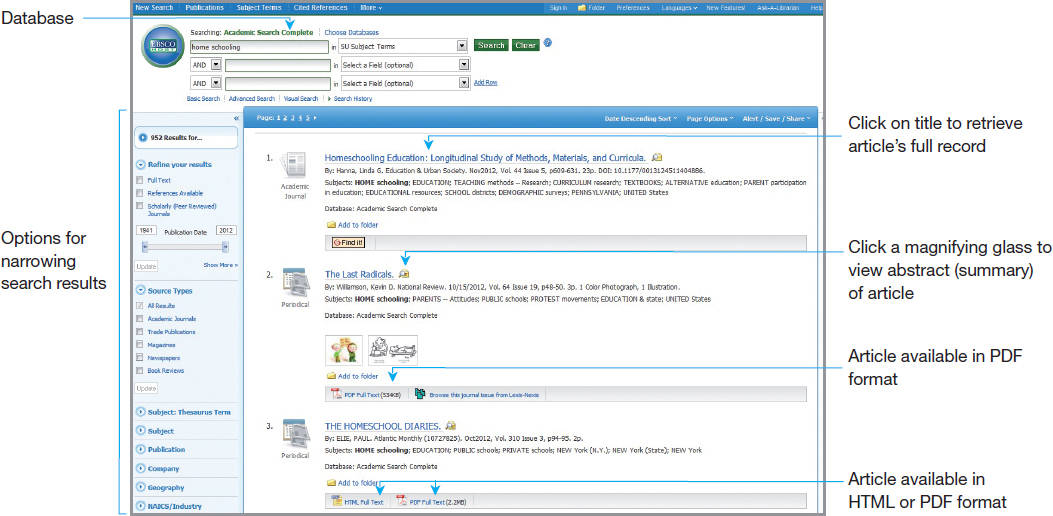Find articles in periodicals using your library’s databases.
Much of the information you will use to write your research project will come from articles in periodicals, publications such as newspapers, magazines, or scholarly journals that are published at regular intervals. To locate relevant articles on your topic, start your search with one of your library’s databases. Why not just start with a Google search? There are two very good reasons:
- Google will pull up articles from any publication it indexes, from freely available personal Web sites to scholarly journals. Results rise to the top of the list based on a number of factors but not necessarily the reliability of the source. A Google search will turn up helpful sources, but you will need to spend a good deal of time sifting through the numerous hits you get to find sources that are both relevant and reliable. (Google Scholar may help you locate more reliable sources than those you might find through a typical Google search.)
- Sources you find through Google may ask you to pay for access to articles, or they may require a subscription. Your library already subscribes to these sources on your behalf. Also, adding databases to your search strategy will round out and diversify your search, and provide you with access to resources not available through a search engine such as Google.
Most college libraries subscribe at least to general databases and subject-specific databases as well as databases that index newspapers. General databases (such as Academic OneFile, Academic Search Premier or Elite or Complete, and ProQuest Central ) index articles from both scholarly journals and popular magazines.1 Subject-specific databases (such as ERIC—Education Resources Information Center, MLA International Bibliography, PsycINFO, and General Science Full Text) index articles only in their discipline. Newspaper databases (such as Alt-Press Watch, LexisNexis Academic, National Newspaper Index, and ProQuest Newspapers) index newspaper articles. For college-level research projects, you may use all three types of databases to find appropriate articles. (Note that many libraries also offer ways to search multiple databases at once.) For the research project on home schooling that appears in Chapter 27, “Citing and Documenting Sources in MLA Style,” Cristina Dinh might have consulted both a general database and a subject-specific database like ERIC.
1The names of these databases change over time and vary from library to library, so ask your instructor or a reference librarian if you can help identify a general database.
If your database search returns too many unhelpful results, use the search strategies discussed at the beginning of this chapter (p. 675) or use the database’s advanced search options to refine your search. Many databases allow users to restrict results to articles published in academic journals, for example, or to articles that were published only after a certain date (see Figure 24.2). Use the Help option or ask a librarian for assistance.
Increasingly, databases provide access to full-text articles, either in HTML or PDF format. When you have the option, choose the PDF format, as this will provide you with photographs, graphs, and charts in context, and you will be able to include the page numbers in your citation. If you find a citation to an article that is not accessible through a database, however, do not ignore it. Check with a librarian to find out how you can get a copy of the article.
